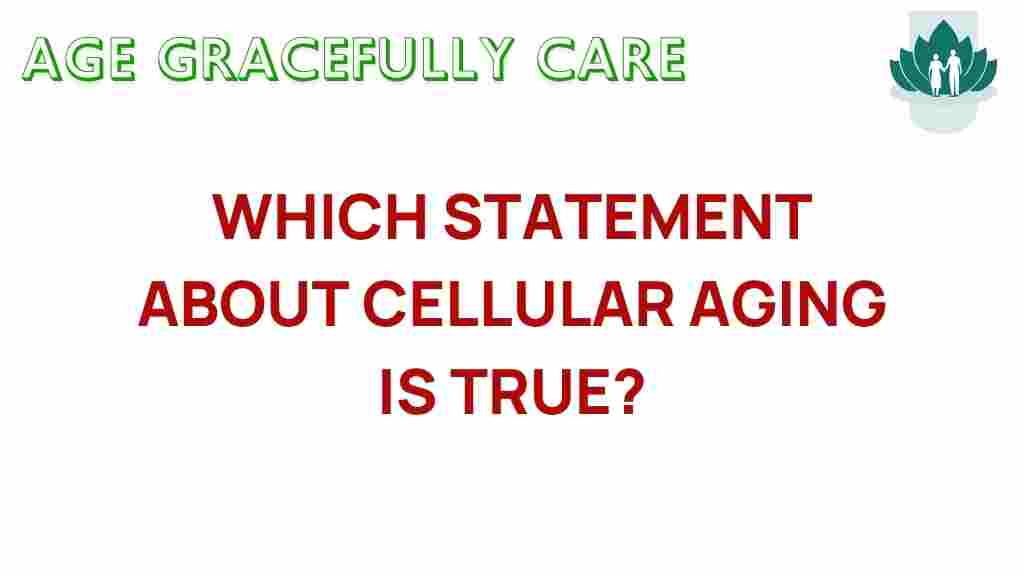Unraveling the Truth Behind Cellular Aging
Cellular aging is a complex biological process that affects all living organisms. Understanding how it works is crucial for enhancing our health and longevity. In this article, we will explore the mechanisms behind cellular aging, its impact on our biological clock, and what we can do to potentially extend our lifespan. By diving deep into the realms of genetics, research, and cellular regeneration, we aim to equip you with the knowledge you need to navigate age-related diseases effectively.
The Biological Clock: Understanding Cellular Aging
The concept of the biological clock is essential to understanding cellular aging. Our cells have a limited capacity for division, which is influenced by various genetic and environmental factors. This limitation is often described through the lens of the Hayflick limit, which is the number of times a normal somatic (non-reproductive) human cell can divide before cell division stops, leading to cellular aging.
Key Factors of Cellular Aging
Several key factors contribute to cellular aging:
- Genetics: Our genetic makeup plays a significant role in how quickly we age at the cellular level. Certain genes are associated with longevity and may protect against age-related diseases.
- Telomeres: These protective caps at the ends of chromosomes shorten with each cell division, contributing to cellular aging. Once telomeres become too short, the cell can no longer divide.
- Oxidative Stress: Accumulation of oxidative damage over time can lead to cellular dysfunction and aging.
- Inflammation: Chronic low-grade inflammation is linked to many age-related diseases and can accelerate the aging process.
Research on Cellular Aging and Longevity
Recent research into cellular aging has unveiled a wealth of information about how we can promote health and longevity. Studies have shown that certain lifestyle choices can positively influence aging at the cellular level.
Promising Areas of Research
Some exciting areas of research regarding cellular aging include:
- Caloric Restriction: Evidence suggests that caloric restriction can extend lifespan by reducing metabolic rate and oxidative stress. It may also enhance cellular repair mechanisms.
- Senolytics: These are drugs designed to selectively eliminate senescent cells, which are cells that have lost the ability to divide and contribute to aging and age-related diseases.
- Stem Cell Therapy: Stem cells have the potential to regenerate damaged tissues and organs, offering hope for reversing some aspects of cellular aging.
For more information on the latest research findings, visit the National Institute on Aging.
The Role of Genetics in Cellular Aging
Genetics significantly influences how our cells age. Some individuals possess genetic variations that enhance their ability to repair cellular damage, resist oxidative stress, or maintain longer telomeres. Understanding your genetic predispositions can provide insights into your health and longevity.
Genetic Testing and Longevity
Genetic testing can help identify specific markers associated with aging and age-related diseases. By understanding these markers, individuals can:
- Make informed lifestyle choices.
- Engage in preventive health measures.
- Participate in research studies aimed at extending lifespan.
Cell Regeneration: A Key to Longevity
Cell regeneration is a vital process that can counteract the effects of cellular aging. Stem cells play a critical role in this process, as they have the ability to differentiate into various cell types and replenish damaged tissues. Enhancing the body’s natural regenerative capabilities can potentially lead to improved health and longevity.
Methods to Enhance Cell Regeneration
Several approaches can promote cell regeneration, including:
- Exercise: Regular physical activity has been shown to enhance the body’s regenerative capacity by promoting muscle and stem cell health.
- Nutrition: A balanced diet rich in antioxidants, vitamins, and minerals supports cellular repair and regeneration.
- Sleep: Quality sleep is essential for overall health and plays a vital role in cellular repair processes.
Age-Related Diseases and Cellular Aging
As cells age, the risk of developing age-related diseases increases. Understanding the link between cellular aging and these diseases can empower individuals to take preventive measures.
Common Age-Related Diseases
Some common age-related diseases include:
- Cardiovascular Diseases: Aging cells can lead to arterial stiffness and heart disease.
- Alzheimer’s Disease: Cellular aging in the brain is linked to neurodegenerative diseases.
- Type 2 Diabetes: Aging can affect insulin sensitivity and glucose metabolism.
- Osteoporosis: Cellular aging impacts bone density and health.
Preventive Strategies Against Age-Related Diseases
To mitigate the risk of age-related diseases, consider the following strategies:
- Regular Health Screenings: Early detection of health issues can lead to better outcomes.
- Healthy Lifestyle Choices: Adopt a balanced diet, engage in regular exercise, and avoid smoking and excessive alcohol consumption.
- Stress Management: Chronic stress can accelerate cellular aging; practices like meditation and mindfulness can be beneficial.
Conclusion: Embracing the Future of Cellular Aging Research
Understanding cellular aging is vital for promoting health and longevity. As research continues to uncover the intricacies of our biological clock, genetics, and cellular regeneration, we gain valuable insights into how we can enhance our lifespan and mitigate age-related diseases.
By adopting healthy lifestyle habits, staying informed about the latest research, and considering genetic factors, individuals can take proactive steps toward a healthier future. Remember, the journey of aging can be embraced with knowledge and empowerment, enabling us to live our lives to the fullest.
For further reading on cellular aging and longevity, feel free to explore our related articles.
This article is in the category Health and created by AgeGracefullyCare Team
